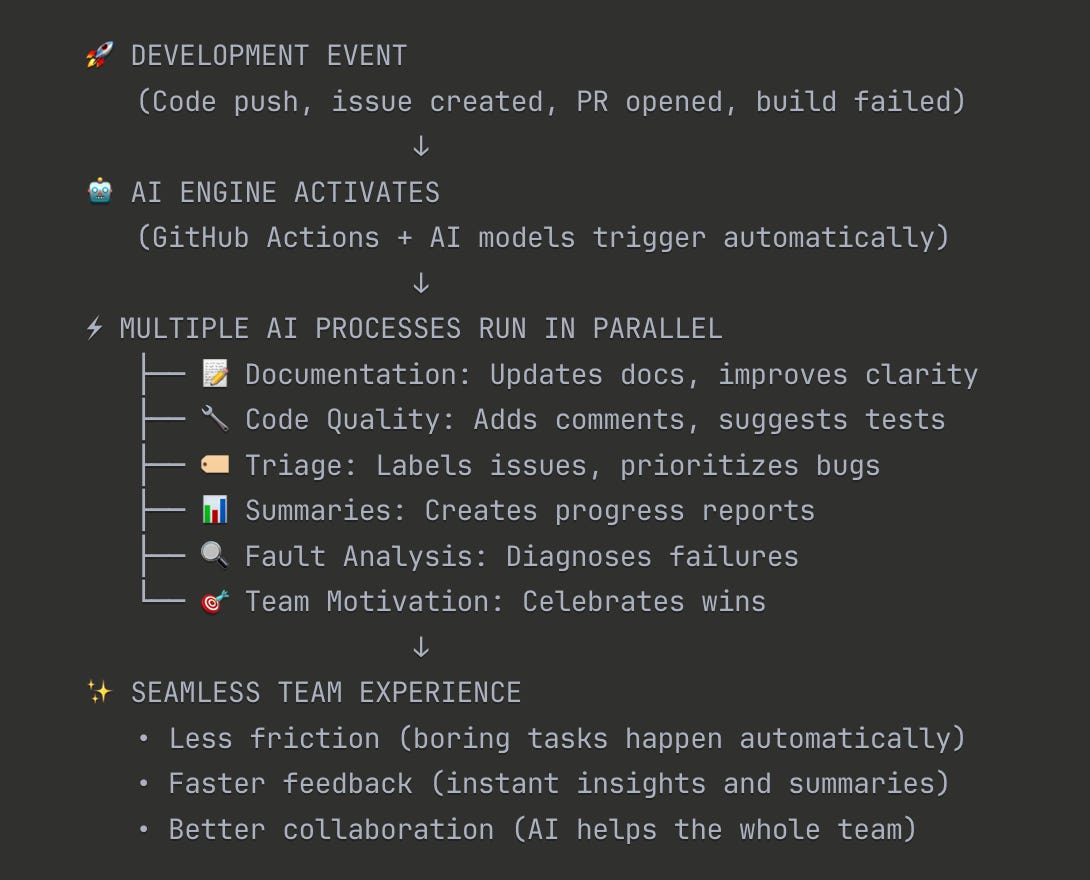From CI/CD to CAI (Continuous AI)
Why Continuous AI is the Next Big Step in Software Development
Remember when we first got CI/CD working? Every code push automatically built, tested, and deployed our software. It felt like magic. Now we barely think about it.
GitHub Next has a name for what's coming next: Continuous AI1. It's the same idea, but for team collaboration. Instead of just automating our code pipeline, we're automating how we work together.
What This Actually Looks Like
GitHub has mapped out the main ways teams are already using this:
Documentation that stays current: AI updates docs as code changes and suggests better ways to explain things.
Code that improves itself: Comments get clearer, tests get added, and quality issues get flagged automatically.
Issues that sort themselves: AI labels bugs, summarizes problems, and even suggests solutions.
Project summaries that write themselves: Instead of digging through dozens of commits and comments, you get a clear picture of what happened.
Failures that explain themselves: When builds break, AI tells you why and how to fix it.
Quality checks that never sleep: Code standards get enforced consistently, no matter who's reviewing.
Team motivation on autopilot: AI celebrates wins and keeps everyone motivated (sometimes with terrible poetry).
Accessibility that happens by default: Documents and code become more accessible in real time.
The pattern here is simple: if it's repetitive, team-focused, and can be triggered by events, AI can probably help.
It's About the Team, Not Just You
This isn't about giving individual developers superpowers. It's about making the whole team work better together. The key is transparency. Teams decide which AI models to use, when to use them, and how they work.
Where to Start Today
GitHub already supports this through Actions plus GitHub Models. You can use frameworks like GenAIScript, llm, or the actions/ai-inference action. Most of these tools are open source and community-built, just like the early CI/CD ecosystem.
GitHub sees this as a long-term shift, not a quick trend. They're thinking 30+ years, not 30+ days.
Why This Matters
Three big reasons:
It removes friction. You know those small tasks your team should do but often skips? AI handles them automatically.
It speeds up feedback. Instead of waiting for someone to write a summary or diagnose a problem, you get answers immediately.
It makes AI part of your team culture, not just a personal assistant.
In five years, every serious engineering team will run Continuous AI alongside their CI/CD pipeline. These systems will work invisibly in the background, shaped by the community rather than locked to one vendor. They'll be transparent and adjustable, built right into how teams collaborate.
The question isn't whether this will happen. It's when you'll start and how thoughtfully you'll approach it.
https://githubnext.com/projects/continuous-ai/

